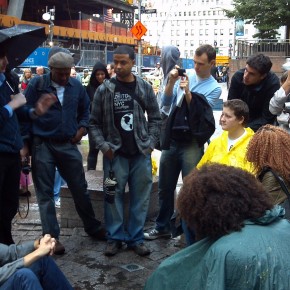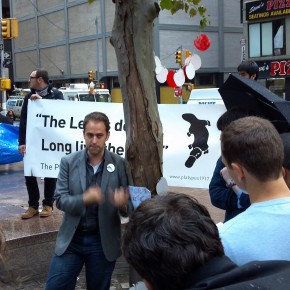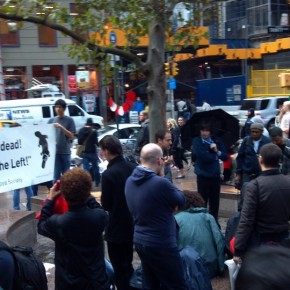<span class="Apple-style-span" style="font-size: 12px;">Platypus in New York will be giving a series of talks on<em> The Relevance of Marxism Today</em> at Occupy Wall st., look out for the banner and come join us for discussion.</span><a
On wednesday 9/14 Platypus hosted a dialogue with Sebastian Fraenkle, editor of the influential German left journal Phase II revolving around what does contemporary landscape of left politics look like in Germany and the United States? What are the points of convergence and departure that shape left politics in these two countries? What might we learn from one another? This conversation will touch on the legacy of 9-11, the Anti-Deutsch milieu, popular anticapitalism versus value critique, the relative prominence of the Marxist and anarchist traditions, and the contentious differences in orientation towards the Israel-Palestine conflict, among other themes.
Hosted by the Platypus Affiliated Society.
|
Room 804, Kimmel Center, New York University (60 Washington Square South)
|
In the mid-19th century, Marx and Engels famously observed in the Communist Manifesto that a 'specter' was haunting Europe— the specter of Communism. 160 years later, it is 'Marxism' itself that haunts us.
In the 21st century, it seems that the Left abandoned Marxism as a path to freedom. But Marx critically intervened in his own moment and emboldened leftists to challenge society; is the Left not tasked with this today? Has the Left resolved the problems posed by Marx, and thus moved on?
For more information, please contact Brian Hioe: bch250@nyu.edu
On Wednesday September 14th, 2011 in New York City, Platypus hosted a dialogue with Sebastian Traenkle, editor of the influential German left journal Phase II revolving around what does contemporary landscape of left politics look like in Germany and the United States? What are the points of convergence and departure that shape left politics in these two countries? What might we learn from one another? This conversation will touch on the legacy of 9-11, the Anti-Deutsch milieu, popular anticapitalism versus value critique, the relative prominence of the Marxist and anarchist traditions, and the contentious differences in orientation towards the Israel-Palestine conflict, among other themes.
This event is part of the transatlantic dialogue series initiated by the Platypus Affiliated Society which aims to rebuild an emancipatory internationalism.
A lecture by Platypus member James Vaughn upon the history of humanity up to 1750, given as part of the Platypus summer 2011 radical bourgeois philosophy reading group. Held on June 30st, 2011 at New York University.
Platypus Summer Reading Group 2011: Radical Bourgeois Philosophy
Rousseau-Smith-Kant-Hegel-Nietzsche
We will address the greater context for Marx and Marxism through the issue of bourgeois radicalism in philosophy in the 18th and 19th Centuries. Discussion will emerge by working through the development from Kant and Hegel to Nietzsche, but also by reference to the Rousseauian aftermath, and the emergence of the modern society of capital, as registered by liberals such as Adam Smith and Benjamin Constant.
"The principle of freedom and its corollary, 'perfectibility,' . . . suggest that the possibilities for being human are both multiple and, literally, endless. . . . Contemporaries like Kant well understood the novelty and radical implications of Rousseau's new principle of freedom [and] appreciated his unusual stress on history as the site where the true nature of our species is simultaneously realized and perverted, revealed and distorted. A new way of thinking about the human condition had appeared. . . . As Hegel put it, 'The principle of freedom dawned on the world in Rousseau, and gave infinite strength to man, who thus apprehended himself as infinite.'"
- James Miller (author of The Passion of Michel Foucault, 2000), Introduction to Rousseau, Discourse on the Origin of Inequality (Hackett, 1992)




